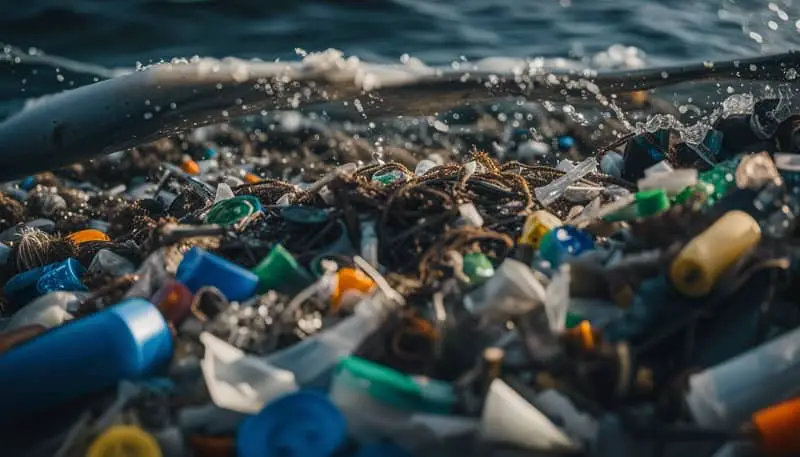
Table of Contents
Introduction
Plastic pollution in the ocean is a major environmental issue that requires urgent attention and optimal solutions. The impact of plastic pollution on our oceans is devastating, affecting marine life, ecosystems, and even human health.
The sheer volume of plastic waste that ends up in the ocean is staggering, with an estimated 8 million metric tons entering the marine environment every year. This waste not only poses a physical threat to marine animals, who can become entangled in or ingest plastic debris, but it also releases harmful chemicals into the water, further polluting the ecosystem.
Finding optimal solutions to address this global problem is crucial. It requires a multi-faceted approach that involves individuals, communities, governments, and industries working together.
By implementing effective waste management systems, promoting recycling and reuse, and reducing the production and consumption of single-use plastics, we can significantly reduce the amount of plastic waste that ends up in our oceans.
Moreover, raising awareness about the issue and educating the public about the importance of responsible plastic use and disposal is essential. By changing our behaviors and adopting more sustainable practices, we can make a positive impact on the health of our oceans and the planet as a whole.
In this article, we will explore a range of actions and solutions at different levels, from national policies and regulations to local government initiatives and individual actions. By understanding the importance of addressing ocean plastic waste and implementing these solutions, we can work towards a cleaner and healthier future for our oceans and the life they support.
List of Actions to Manage Plastic Pollution in the Ocean
To effectively address the global problem of ocean plastic waste, it is crucial to implement optimal solutions at various levels, including national, local government, and individual levels. By taking action at each of these levels, we can make a significant impact in reducing plastic pollution in our oceans.
Here are five impactful solutions at each level and their importance:
National Level
1. Implement Strong Environmental Policies and Regulations
Governments play a vital role in addressing ocean plastic waste by enacting and enforcing strict policies and regulations. These measures can include bans on single-use plastics, restrictions on plastic production, and requirements for proper waste management practices.
By setting clear guidelines and holding industries accountable, governments can significantly reduce the amount of plastic waste entering our oceans. The government can enforce these guidelines through monitoring schemes to ensure compliance.
2. Invest in Research and Development of Sustainable Alternatives
National governments can allocate resources to support research and development of sustainable alternatives to plastic. This includes funding for innovative technologies and materials that can replace single-use plastics.
By promoting the use of biodegradable or compostable materials, governments can encourage the adoption of more environmentally friendly options and reduce plastic waste. Thus, a better, cleaner environment results thereby enhancing the health of citizens.
3. Promote Extended Producer Responsibility
Extended Producer Responsibility or EPR is a policy approach that holds manufacturers responsible for the entire lifecycle of their products, including proper disposal and recycling. In doing so, manufacturers are able to figure out solutions to reduce their environmental impact as well as save on costs.
By implementing EPR programs, governments can incentivize manufacturers to design products that are easier to recycle and ensure that they take responsibility for the proper management of their products’ waste. This approach encourages a circular economy and reduces the amount of plastic waste that ends up in our oceans.
4. Strengthen International Cooperation and Agreements
Ocean plastic waste is a global problem that requires international collaboration. National governments can work together to develop and implement agreements that address plastic pollution, such as the Basel Convention on the Control of Transboundary Movements of Hazardous Wastes and their Disposal.
By joining forces, countries can share best practices, exchange knowledge, and coordinate efforts to tackle this issue on a global scale. Thus, greater impact of large-scale initiatives can substantially clean up the oceans.
5. Invest in Public Awareness and Education
National governments have the power to raise awareness about the impact of plastic pollution on our oceans and educate the public about responsible plastic use and disposal. They can hold public awareness campaigns on ocean plastic pollution.
By investing in public awareness campaigns, governments can encourage behavior change and promote sustainable practices. This includes educating citizens about the importance of recycling, reducing plastic consumption, and supporting initiatives that aim to clean up our oceans.
Local Government Level
1. Implement Plastic Bag Bans and Fees
Local governments can enact ordinances and resolutions to ban or impose fees on single-use plastic bags. By discouraging their use, local communities can reduce the amount of plastic waste that ends up in landfills and ultimately in our oceans.
This solution encourages the adoption of reusable bags and promotes a more sustainable lifestyle. This approach can also help households save on costs.
2. Establish Effective Recycling Programs
Local governments can play a crucial role in establishing and maintaining efficient recycling programs. This includes providing accessible recycling bins, educating residents about proper recycling practices, and collaborating with recycling facilities to ensure that collected materials are effectively processed.
By making recycling convenient and accessible, local governments can encourage residents to recycle and divert plastic waste from our oceans. Changing people’s behavior on waste disposal takes time, but with constant monitoring and incentives, citizens will gradually integrate desirable behaviors that will benefit everyone on the long term.
3. Support Community Clean-Up Initiatives
Local governments can support and facilitate community clean-up initiatives aimed at removing plastic waste from beaches, coastlines, and other areas prone to pollution. Such simple activities can get rid of unsightly and harmful plastics littering these areas.
By organizing regular clean-up events and providing resources such as gloves, bags, and transportation, local governments can empower communities to take action and actively participate in keeping their environment clean.
These initiatives not only remove existing plastic waste but also raise awareness about the issue and foster a sense of environmental stewardship. They get to reap the satisfaction of better landscapes and seascapes.
4. Encourage Sustainable Practices in Businesses and Restaurants
Local governments can work with businesses and restaurants to promote sustainable practices. This can include providing incentives for businesses to reduce their use of single-use plastics, such as offering tax breaks for establishments that switch to eco-friendly alternatives.
By encouraging businesses to adopt sustainable practices, local governments can create a ripple effect within the community and inspire others to follow suit. Once these practices become a habit, benefits will accrue to everyone in terms of cleaner oceans and seaside areas.
5. Implement Stormwater Management Systems
Local governments can implement stormwater management systems that prevent plastic waste from entering waterways during heavy rainfall. This can include the installation of trash traps and litter screens in storm drains, as well as the implementation of green infrastructure solutions that help filter and absorb pollutants.
By effectively managing stormwater, local governments can prevent plastic waste from being washed into our oceans and protect the health of marine ecosystems. Marine life will benefit greatly from cleaner wastewater input to aquatic ecosystems.
Individual Level
1. Reduce Single-Use Plastic Consumption
Individuals can make a significant impact by reducing their consumption of single-use plastics. This includes using reusable water bottles, coffee cups, and shopping bags, as well as opting for products with minimal or no plastic packaging.
By making conscious choices and adopting more sustainable habits, individuals can significantly reduce the amount of plastic waste they generate. Thus, less impact will be made to the surrounding environment.
2. Properly Dispose of Plastic Waste
Proper disposal of plastic waste is essential to prevent it from ending up in our oceans. Individuals should ensure that plastic items are disposed of in designated recycling bins whenever possible.
If recycling facilities are not available, individuals should dispose of plastic waste in proper trash bins to prevent it from being carried away by wind or rain into waterways. Garbage disposal teams should ensure that proper segregation at source is practiced by everyone through their feedback on the manner of household waste disposal.
3. Participate in Beach Clean-Ups and Volunteer Efforts
Individuals can actively contribute to the clean-up of plastic waste by participating in beach clean-ups and volunteering for environmental organizations. By dedicating their time and effort to removing plastic debris from beaches and coastal areas, individuals can directly contribute to the preservation of marine ecosystems and the prevention of further pollution.
4. Support Sustainable Brands and Products
Individuals can support brands and products that prioritize sustainability and offer alternatives to single-use plastics. By choosing to purchase from companies that prioritize eco-friendly practices and packaging, individuals can send a message to the market and encourage more businesses to adopt sustainable practices.
5. Advocate for Change
Individuals can use their voice to advocate for change and raise awareness about the issue of ocean plastic waste. This can include sharing information on social media, writing to local representatives, and supporting organizations that work towards solutions.
By amplifying the message and demanding action, individuals can contribute to the collective effort in addressing this global problem.
Optimal solutions at the national, local government, and individual levels can make significant progress in managing ocean plastic waste. It is essential for governments, communities, and individuals to work together to protect our oceans and ensure a sustainable future for generations to come.
Conclusion
The list of actions presented in this article provides a comprehensive approach to managing ocean plastic waste.
At the national level, implementing strong environmental policies and regulations, investing in research and development of sustainable alternatives, promoting extended producer responsibility, strengthening international cooperation and agreements, and investing in public awareness and education campaigns are crucial steps in reducing plastic pollution.
Local governments can contribute by implementing plastic bag bans and fees, establishing effective recycling programs, supporting community clean-up initiatives, encouraging sustainable practices in businesses and restaurants, and implementing stormwater management systems.
At the individual level, reducing single-use plastic consumption, properly disposing of plastic waste, participating in beach clean-ups and volunteer efforts, supporting sustainable brands and products, and advocating for change are actions that each individual can take to make a difference.
To reduce ocean plastic waste and create a better environmental condition, it is essential for individuals to make conscious choices in their daily lives. By reducing the use of single-use plastics, properly disposing of plastic waste, and supporting sustainable alternatives, individuals can significantly contribute to the reduction of plastic pollution.
Additionally, participating in clean-up efforts and advocating for change can help raise awareness and inspire others to take action. It is through collective efforts and individual actions that we can create a positive impact on our oceans and ensure a sustainable future for generations to come. Let us all take responsibility and work together to protect our oceans from the harmful effects of plastic waste.



